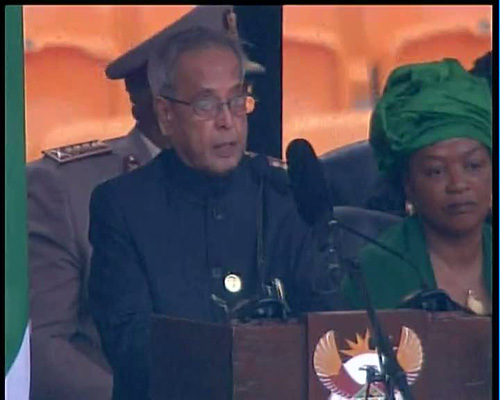Speech by the President of India, Shri Pranab Mukherjee on the Occasion of the Memorial Service in Honour of Dr. Nelson Mandela, Former President of South Africa
FNB Stadium, Johannesburg, South Africa : 10.12.2013
 (145.79 KB)
(145.79 KB) President Jacob Zuma,
President Jacob Zuma,
Distinguished Leaders of the African National Congress,
Eminent Heads of State and Governments and
Representatives of the world community gathered here today,
It is with the deepest reverence that I, on behalf of the Government and the people of India, join the South African nation in paying homage to their beloved Madiba, former President, Dr. Nelson Mandela.
For India, the passing of Nelson Mandela represents the departure of a venerated elder, a great soul. We pray for his eternal peace. Madiba lived a life of sacrifice and privation as he pursued a seemingly impossible goal for his people – and the world is richer for his legacy. We, in India, have long admired him - and all that he stood for - and we will always cherish his friendship and love for our people.
To us, Nelson Mandela was a visionary. He epitomised an uncommon humaneness that inspired all of mankind. He was an icon of irreversible social and economic change – the kind of transformation and emancipation that his people had only dreamt of. A towering personality of great compassion and wisdom, he guided his nation, bruised by decades of apartheid and violence, to embrace his simple message of tolerance and harmonious co-existence. Indeed, his life and struggles - which represented ‘hope’ for the downtrodden in South Africa and all over the world, remind us of the principles that the father of our Nation, Mahatma Gandhi, stood for. In the face of the severest persecution, punishment and relentless oppression, Nelson Mandela continued his non-violent struggle with dignity and pride, refusing to be intimidated. He never diminished his commitment to his kind of ‘satyagraha’ against injustice and inequality. His stoic determination, patience and magnanimity reminded us, in India, of the revolutionary methods of Mahatma Gandhi.
It was, therefore, an honour ¬¬ for Indians to confer upon Madiba our highest civilian award, the Bharat Ratna when he visited India in 1990. Madiba received an unprecedented public welcome and was felicitated in Delhi and Calcutta.
In 1995, when he visited India as the first President of post apartheid Africa, Mandela visited Gandhiji’s Sabarmati Ashram and said that it was for him a homecoming, a pilgrimage.
We, on our part, associate South Africa with the first chapter of Mahatma Gandhi’s freedom movement. Gandhiji had staked his career as a budding lawyer in South Africa to resist segregation and inequality - before he embarked for India and took up, in India, the same cause.
The six principles that Madiba identified as the fundamentals of the foreign policy of the new South Africa – equal human rights, democracy, respect for international law, world peace achieved through non-violent means, effective arms control regimes and economic co-operation in an interdependent world, are the same principles that the Founding Fathers of free India had enshrined in our own policy of Panchsheel.
Madiba often acknowledged the influence of Mahatma Gandhi and the first Prime Minister of India, Jawarharlal Nehru on his own thought process. It is no wonder then that we, in India, attach great sentiment to our unique friendship with the people of this great country South Africa.
We stand by you in your hour of bereavement and we share your sense of loss today.
We have no doubt that the world will honour the historic legacy of Madiba, one of the most influential personalities of our century, who taught the world the true meaning of forgiveness and reconciliation - and steered South Africans onto the path of building a truly Rainbow Nation.
Jai Hind!








